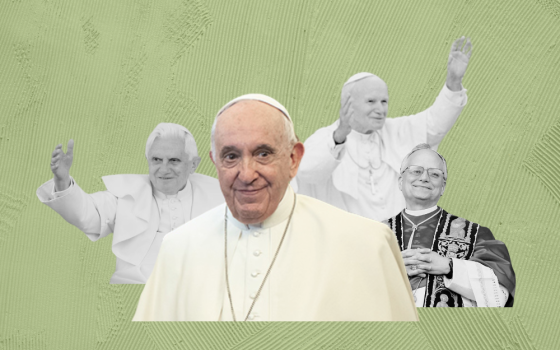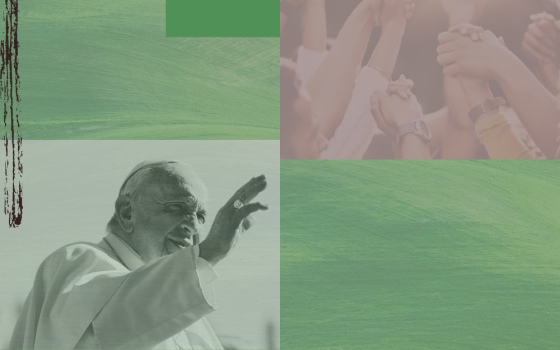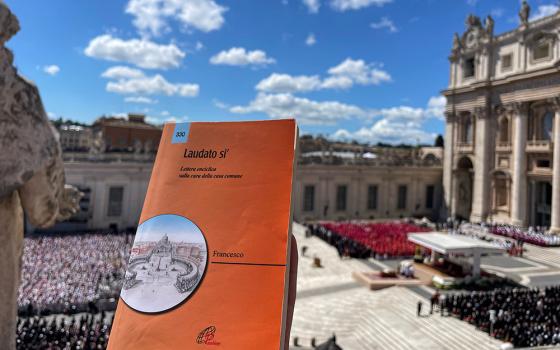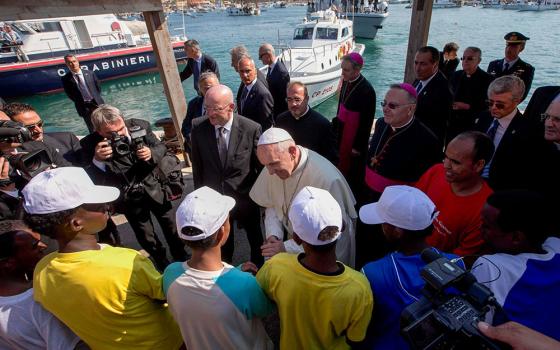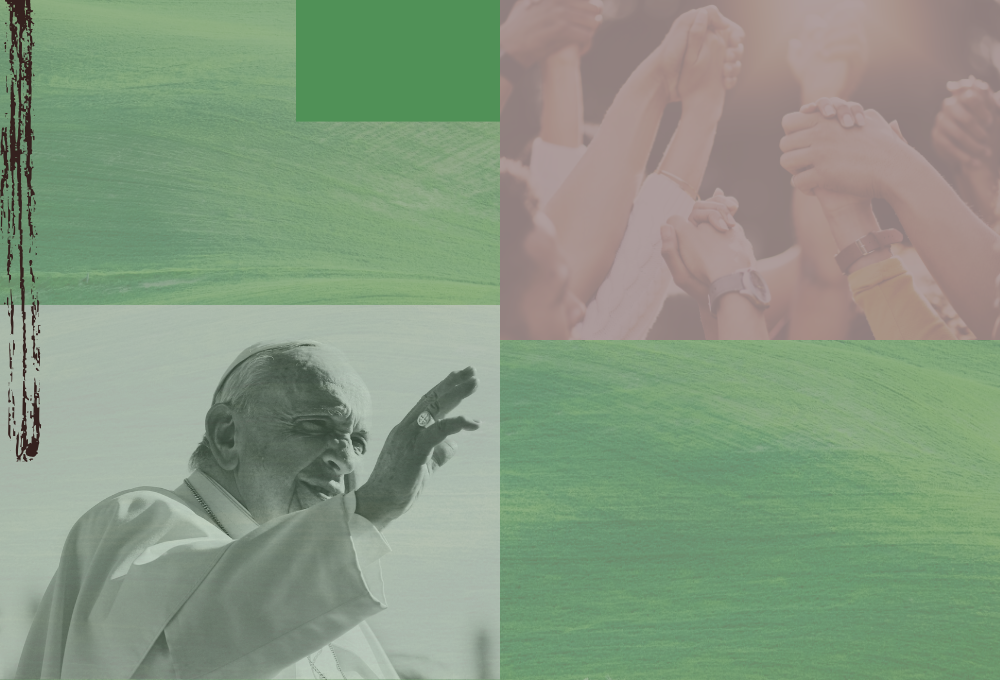
(GSR graphic/Olivia Bardo; Pope Francis photo via CNS/Reuters/Guglielmo Mangiapane)
Now that Pope Leo XIV has been elected, perhaps reflections about the late Pope Francis can resume for a time.
One question will center on Francis' theological legacy. What were his contributions to the field of theology? How lasting will they be? Will his successor embrace them?
In a recent joint interview with Global Sisters Report, two Catholic sister theologians — Sr. Maeve Heaney and Sr. Maria Cimperman — agreed that a cornerstone of Francis' legacy will be its focus on pastoral theology and the importance of engaging with the lived experiences of people, especially the marginalized. Also important was his openness to dialogue and his call for a synodal church, meaning one that is less clerical and that actively invites a diversity of lay voices into discussion of church matters.
Another cornerstone likely to have a lasting impact: Francis' teachings on care for the Earth, particularly the landmark encyclical "Laudato Si', on Care for Our Common Home."
Heaney is a member of the Verbum Dei Community who teaches at Australian Catholic University in Brisbane.
Advertisement
Cimperman is a Religious of the Sacred Heart of Jesus who teaches theological ethics and consecrated life at the Catholic Theological Union in Chicago. She is currently living in Rome and serving as synodality coordinator at the International Union of Superiors General, or UISG.
This is the first of a two-part interview.
GSR: Francis was not a trained theologian like Benedict XVI, but he no doubt made a contribution to theology. What do you think that contribution will be?
Heaney: I don't know whether we need to define Francis as a theologian, but I do push back when I hear people say, "Well, he wasn't a theologian. His contribution wasn't to theology; it was to pastoral [ministry]" — the contrast being with Pope Benedict. I think that's false. I think he had a very clear vision for what theology should be doing and was very intentional about that.
I think having a lens that is pastoral doesn't mean you're less theologically aware or that it affects theology less. I think he really did open theology in a lot of ways and that theology was very much on his radar without having to define him as a theologian.
Cimperman: While he might have said, "I'm not a theologian," he certainly asked a lot of theologians. He asked us to be on the ground. He asked, in the way [the late Peruvian liberation theologian] Gustavo Gutiérrez also did, "If you really care about people made poor, what's your relationship with them? Who are they? What are their names?"
After the conclusion of the 2023 synod assembly, Francis published a motu proprio [a papal document the pope initiates based on his own interests] that asked us to have a theology that was outgoing, contextual, transdisciplinary, dialogical, connected to a web of relationships — in the midst of knowing the depth and breadth of our tradition. This is what he expected of theologians.
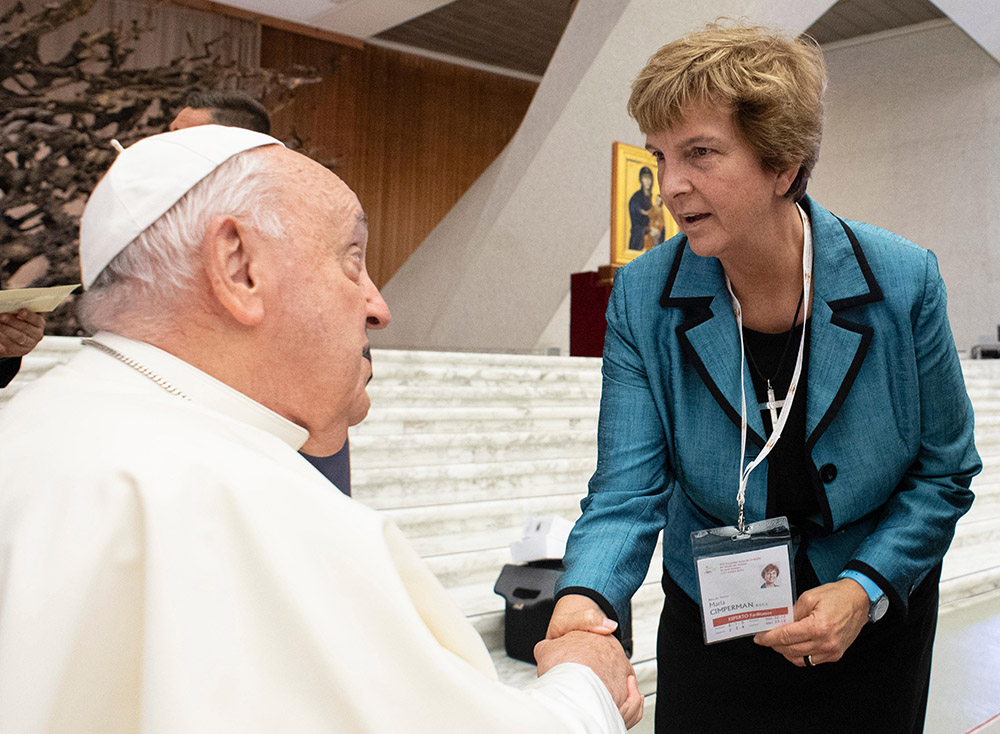
Pope Francis greets synod delegate Sr. Maria Cimperman, a Religious of the Sacred Heart of Jesus, before a working session of the Synod of Bishops on synodality at the Vatican Oct. 4, 2024. (CNS/Vatican Media)
He also wanted us connected to the people, to the Earth. The personal, the pastoral, the theological are supposed to be linked, just as in Laudato Si'. What Francis reminded us is the Earth and people are linked. You can't have one without the other. He was actually helping us do more integration.
Additionally, he wanted theologians to work together and in a synodal way, listening to one another, expanding the circle of listening, dialoguing and discerning communally.
In the final synod document, which Pope Francis approved, we hear the call to foster dialogue between theologians and pastors. We need to work together more, in service. We are to all, and together, serve the people of God, walking together toward the reign of God.
Do you think Laudato Si' will be Francis' most enduring legacy theologically?
Heaney: It's definitely one of his most important contributions. It's probably the most visible in terms of the [wider] world. I think it's a document that drew the attention of everybody, and it's the first time I've seen the Vatican organize an "action plan" around church doctrine.
I think it will stand as a tremendous legacy for the world as a connection point and perhaps a creative 'theology point' as well, because, let's face it, it did shift our spirituality, which has been either very individual or very moralistic-sexual rather than creative-environmental.
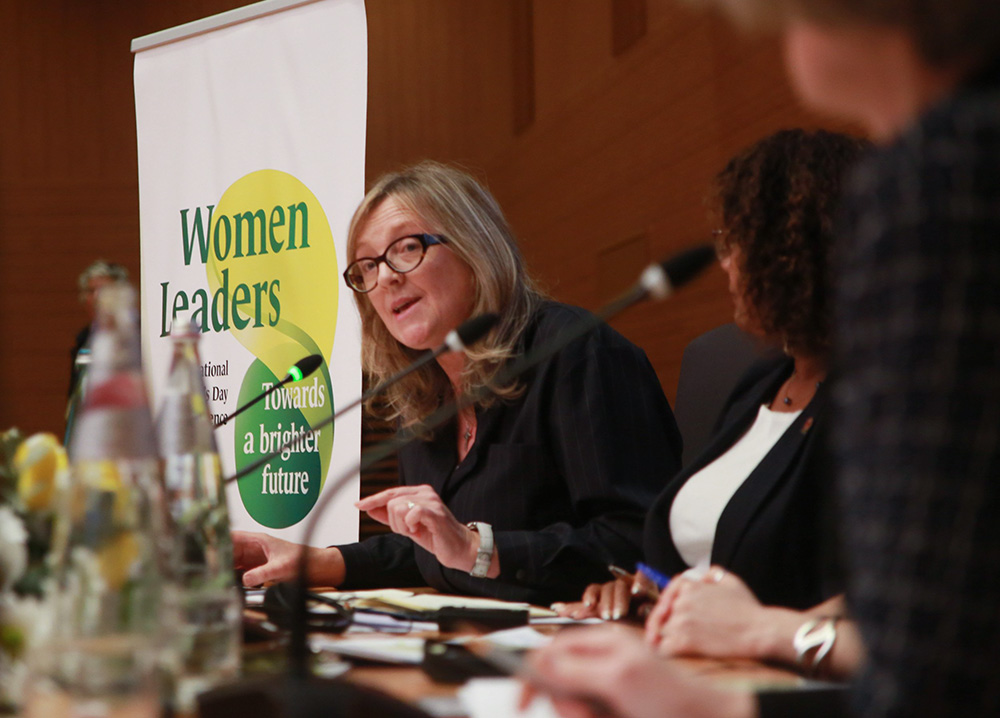
Verbum Dei Sr. Maeve Heaney speaks at the conference "Women Leaders: Toward a Brighter Future," March 6, 2024, at the Jesuit headquarters in Rome. (CNS/Courtesy of Kathrin Ziegler)
Cimperman: Pope John Paul II had an awareness of the ecological crisis: His 1990 World Day of Peace Message was significant. And Pope Benedict's encyclical Caritas in Veritate was about the interconnectedness between humans and the Earth and had beautiful passages in it that are often missed.
Pope Francis and Laudato Si' moved awareness to whole new levels, and from which movements and collaborations flowed. We have so much more to do in implementing Laudato Si', but he opened much through his writing and engagement.
I would also suggest that while it is not as well known, Fratelli Tutti offered a vision of the world that is also key.
Then there is synodality.
Cimperman: Yes. If I had to name one area for which I believe Francis will be known most significantly, it will be synodality. It is still growing theologically and yet Francis is responsible for opening anew. Synodality will impact how we relate to God, one another and creation.
The final synodality document calls theologians to develop this in all areas possible — and to practice this as we do so.
This ongoing journey of both spiritual renewal and structural reform will impact every area of the church — ecclesiology, sacraments and more. We are living into "How shall we be a church on mission?" and it will move how we participate, communally discern, build community and go forth to love and serve as missionary disciples.
As female theologians, do you feel Francis opened a space for you all to do your work?
Heaney: Yes, I do. I feel like, in the time of Francis, I have been able to ask questions. I believe in moving the church forward, and therefore, I move very carefully, and what I feel is the right step, I'll take it and I'll move it, because I think we should be careful and thoughtful about what we do.
But I feel like I've been able to do that. I feel like I could begin to name things in ways that were sensible that I couldn't before. I think he understood theology, he wanted women in theology, and he allowed us to do it.
There were times I wouldn't agree with his theology, but I think he was the kind of person who could be open to hearing a theological opinion that could engage him and perhaps be thought of in a different way.
Cimperman: I think he was open to be transformed, to be engaged on the role of women. He really worked on it and tried to find those spaces.
I think calling out clericalism was one of those places. I think naming women to high-level posts — as head of the dicastery, appointing women to the Synod of Bishops' council — that was a space. I think he was trying to push what he could.
As a woman theologian, in Francis' time, I felt we could all ask and engage the pressing questions around us.




